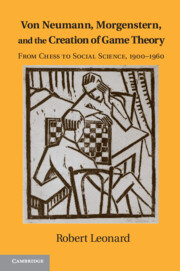Book contents
- Frontmatter
- Contents
- Acknowledgments
- Von Neumann, Morgenstern, and the Creation of Game Theory
- Introduction
- Part One Struggle and Equilibrium: from Lasker to von Neumann
- Part Two Oskar Morgenstern and Interwar Vienna
- 5 Equilibrium on Trial
- 6 Wrestling with Complexity
- 7 Ethics and the Excluded Middle
- 8 From Austroliberalism to Anschluss
- Part Three From War to Cold War
- Bibliography
- Index
- Plate section
5 - Equilibrium on Trial
The Austrian Interwar Critics
Published online by Cambridge University Press: 05 December 2013
- Frontmatter
- Contents
- Acknowledgments
- Von Neumann, Morgenstern, and the Creation of Game Theory
- Introduction
- Part One Struggle and Equilibrium: from Lasker to von Neumann
- Part Two Oskar Morgenstern and Interwar Vienna
- 5 Equilibrium on Trial
- 6 Wrestling with Complexity
- 7 Ethics and the Excluded Middle
- 8 From Austroliberalism to Anschluss
- Part Three From War to Cold War
- Bibliography
- Index
- Plate section
Summary
[At] the beginning of a game of chess, the result is neither subjectively known to the players nor objectively settled…each move in a game of chess is dependent upon previous ones and the final result upon all the moves that have gone before…
In essence, there is an immanent, more or less disguised, fiction at the heart of mathematical equilibrium theories: that is, they bind together, in simultaneous equations, non-simultaneous magnitudes operative in genetic-causal sequence as if these existed together at the same time. A state of affairs is synchronized in the ‘static’ approach, whereas in reality we are dealing with a process.
Hans Mayer (1932), pp. 91–92, emphasis in originalIntroduction
While the Hungarian mathematicians tackled chess in a formal manner, deliberately circumventing the game's psychological complexity and inherent unpredictability, amongst the Viennese economists, the chess metaphor was being put to different use. They seized upon it as an exemplar of complexity.
To the extent that a game of chess involved interdependent steps, taken through time and cumulative in their importance, it was, in the eyes of Oskar Morgenstern's teachers, the quintessential embodiment of a time-bound activity with an unpredictable outcome. If, therefore, one saw the essence of economic exchange, not in the mechanical and instantaneous achievement of an equilibrium, but as a process of uncertain outome in which the passage of time was crucial, then the joint search for a result at the chessboard offered a powerful analogy with which to counter the mechanistic view. This was the understanding of the game metaphor that best characterized the thought-world of Oskar Morgenstern in the late 1920s, and that fact is illustrative of both the gulf then separating him from the Hungarian mathematicians and the distance he would travel in becoming co-author of The Theory of Games.
- Type
- Chapter
- Information
- Von Neumann, Morgenstern, and the Creation of Game TheoryFrom Chess to Social Science, 1900–1960, pp. 77 - 92Publisher: Cambridge University PressPrint publication year: 2010

